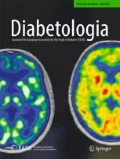Abstract
Aims/hypothesis
The aim of this study was to investigate whether moderate alcohol consumption increases plasma high molecular weight (HMW) adiponectin and/or muscle oxidative capacity.
Materials and methods
Eleven lean (BMI 18–25 kg/m2) and eight overweight (BMI ≥27 kg/m2) men consumed 100 ml whisky (∼32 g alcohol) or water daily for 4 weeks in a randomised, controlled, crossover trial. After each treatment period, muscle biopsies and fasting blood samples were collected.
Results
Adiponectin concentrations increased (p < 0.001) by 12.5% after 4 weeks of moderate alcohol consumption. Moderate alcohol consumption tended to increase HMW adiponectin by 57% (p = 0.07) and medium molecular weight adiponectin by 12.5% (p = 0.07), but not low molecular weight (LMW) adiponectin. Skeletal muscle citrate synthase, cytochrome c oxidase and β-3-hydroxyacyl coenzyme A dehydrogenase (β-HAD) activity were not changed after moderate alcohol consumption, but an interaction between alcohol consumption and BMI was observed for cytochrome c oxidase (p = 0.072) and citrate synthase (p = 0.102) activity. Among lean men, moderate alcohol consumption tended to increase cytochrome c oxidase (p = 0.08) and citrate synthase activity (p = 0.12) by 23 and 26%, respectively, but not among overweight men. In particular, plasma HMW adiponectin correlated positively with activities of skeletal muscle citrate synthase (r = 0.64, p = 0.009), cytochrome c oxidase (p = 0.59, p = 0.009) and β-HAD (r = 0.46, p = 0.056), while such correlation was not present for LMW adiponectin. Whole-body insulin sensitivity and intramyocellular triacylglycerol content were not affected by moderate alcohol consumption.
Conclusions/interpretation
Moderate alcohol consumption increases adiponectin concentrations, and in particular HMW adiponectin. Concentrations of HMW adiponectin in particular were positively associated with skeletal muscle oxidative capacity.
Abbreviations
- β-HAD:
-
β-3-hydroxyacyl coenzyme A dehydrogenase
- HMW:
-
high molecular weight
- IMTG:
-
intramyocellular triacylglycerol
- LMW:
-
low molecular weight
- MMW:
-
medium molecular weight
References
Koppes LL, Dekker JM, Hendriks HF, Bouter LM, Heine RJ (2005) Moderate alcohol consumption lowers the risk of type 2 diabetes: a meta-analysis of prospective observational studies. Diabetes Care 28:719–725
Sierksma A, Patel H, Ouchi N et al (2004) Effect of moderate alcohol consumption on adiponectin, tumor necrosis factor-alpha, and insulin sensitivity. Diabetes Care 27:184–189
Yamauchi T, Kamon J, Waki H et al (2001) The fat-derived hormone adiponectin reverses insulin resistance associated with both lipoatrophy and obesity. Nat Med 7:941–946
Hara K, Horikoshi M, Yamauchi T et al (2006) Measurement of the high-molecular weight form of adiponectin in plasma is useful for the prediction of insulin resistance and metabolic syndrome. Diabetes Care 29:1357–1362
Siler SQ, Neese RA, Hellerstein MK (1999) De novo lipogenesis, lipid kinetics, and whole-body lipid balances in humans after acute alcohol consumption. Am J Clin Nutr 70:928–936
Lowry OH, Passonneau JV (1972) A flexible system of enzymatic analysis. Academic, New York
Koopman R, Schaart G, Hesselink MK (2001) Optimisation of oil red O staining permits combination with immunofluorescence and automated quantification of lipids. Histochem Cell Biol 116:63–68
Gosker HR, van Mameren H, van Dijk PJ et al (2002) Skeletal muscle fibre-type shifting and metabolic profile in patients with chronic obstructive pulmonary disease. Eur Respir J 19:617–625
Bobbert T, Rochlitz H, Wegewitz U et al (2005) Changes of adiponectin oligomer composition by moderate weight reduction. Diabetes 54:2712–2719
Pajvani UB, Hawkins M, Combs TP et al (2004) Complex distribution, not absolute amount of adiponectin, correlates with thiazolidinedione-mediated improvement in insulin sensitivity. J Biol Chem 279:12152–12162
Civitarese AE, Ukropcova B, Carling S et al (2006) Role of adiponectin in human skeletal muscle bioenergetics. Cell Metab 4:75–87
He J, Goodpaster BH, Kelley DE (2004) Effects of weight loss and physical activity on muscle lipid content and droplet size. Obes Res 12:761–769
Stryer L (1988) Citric acid cycle. In: Stryer L (ed.) Biochemistry, 3rd edn. Freeman, New York, pp 373–396
Kokavec A, Crowe SF (2002) Alcohol consumption in the absence of adequate nutrition may lead to activation of the glyoxylate cycle in man. Med Hypotheses 58:411–415
Matsuda M, DeFronzo RA (1999) Insulin sensitivity indices obtained from oral glucose tolerance testing: comparison with the euglycemic insulin clamp. Diabetes Care 22:1462–1470
Acknowledgements
The skilful help of R. Koopman, M. Brouwers and A. Georgieva is gratefully acknowledged. We thank the volunteers for their enthusiastic participation. The research described in this paper was funded by the Dutch Foundation for Alcohol Research.
Duality of interest
The authors have no duality of interest.
Author information
Authors and Affiliations
Corresponding author
Rights and permissions
About this article
Cite this article
Beulens, J.W.J., van Loon, L.J.C., Kok, F.J. et al. The effect of moderate alcohol consumption on adiponectin oligomers and muscle oxidative capacity: a human intervention study. Diabetologia 50, 1388–1392 (2007). https://doi.org/10.1007/s00125-007-0699-8
Received:
Accepted:
Published:
Issue Date:
DOI: https://doi.org/10.1007/s00125-007-0699-8

